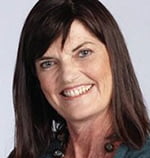Catherine Olsen, executive producer of documentaries at Canadian pubcaster CBC, tells Clive Whittingham about her long-running international doc strand The Passionate Eye.

Catherine Olsen
Tell us about the channel and slot you commission for.
CBC News Network is the Canadian public broadcaster’s second channel and it specialises in news, current affairs and documentaries. The strand I’m responsible for is The Passionate Eye, which has been a showcase – probably the only national showcase – for international documentaries for 23 years.
What sort of programmes air on The Passionate Eye?
It is 100% international and a combination of presales, coproductions and acquisitions. The primary focus is contemporary, issue-driven documentaries, one-hours and features. Also, we programme big historical documentaries that we can show to coincide with an anniversary. We have the 10th anniversary of the Boxing Day tsunami coming up, so we’re looking for a programme we can show to coincide with that. There’s a big anniversary related to the Holocaust soon and a lot of people have things in production to link in with that.
We’re also always in the market for fast-turnaround content, if there’s been a big disaster or news story that has impacted on people internationally. A good example this year was The Mystery of Malaysia Flight 370 – ITN did a brilliant job of turning around a documentary in two weeks and we had it on air 48 hours after that.
Your commissioning strategy seems quite nimble and doesn’t appear to be planned six or 12 months in advance. Or is it a mixture of that and quick-turnarounds?
It’s a mixture. I’m always anticipating. A lot of big documentaries can take a year or two in production, but anticipate what’s coming up in the news and approaching anniversaries, and I’m very lucky to have control over when I schedule documentaries.
I never programme more than three weeks out, which enables me to remain topical. Of course I have a slate of documentaries and a tentative plan, but I don’t lock it down until three weeks away. If something happens I’ll tear apart the schedule and air it immediately.
How early do you like to come in on projects?
Because The Passionate Eye exists in the shadow of a very large market, the US, it means we have to be very aggressive and try to get in as early as possible. The reality is we don’t have a great deal of money, but we are able to commit quickly and early, offer editorial and help create momentum for a project. In that way we can be a valuable asset. I try to get to the project first and encourage people to talk to us before they lock down their American deal.
What are the advantages for producers in doing that?
They can get some immediate cashflow to help them get to the next stage. The Passionate Eye has good international credibility, so if it has been picked up and endorsed by us it means other commissioning editors are going to take a second look at a project. It means you have the opportunity of seeking out or listening to my editorial advice. We can help create that momentum without interfering with your potential US sale because The Passionate Eye has no bleed into the US market whatsoever. So it is possible to carve out a tiny first window and still go and find that big US deal that is most producers’ ambition.

Mystery of Malaysia Flight 370
What audience demographic do you target with The Passionate Eye?
We show issue-driven documentaries of many different styles. I’m very open to experimenting with styles as long as there’s good content and good journalism. I’m trying to target anybody who is interested in issues, world affairs and good storytelling. The Passionate Eye has one of the youngest demographics on our channel and I’m constantly trying to develop a younger audience.
I think the 20-35 crowd is the great untapped audience for documentaries. I’m not changing the way we tell stories, mostly they just don’t know we exist. So it’s about marketing and letting them know there are these great stories they can access. It’s also the reason why I’m encouraging filmmakers, at least in our market, to consider dubbing rather than subtitling.
The thing about the younger demographic is that when they’re watching they’re double-tasking. They have BlackBerrys, smartphones, iPads and other devices and they’re tweeting, emailing and texting. You can’t be doing that and reading subtitles. To appeal to that younger audience – and perhaps an older audience that’s getting lazy – I encourage people to make their documentaries with actors’ voices rather than subtitles. We used to show subtitled docs almost exclusively, but the reality is they’re just not working for our audience anymore.
How should people go about pitching to you?
Initially I like to be reached electronically with a one page, and if you have a promotional tape or sizzle reel that’s even better. Then I encourage people to gently nag me. The reality is I get so much unsolicited email that even if I spent 24 hours a day looking at it I couldn’t possibly read it all. The ones that nag me a little bit – not too aggressively but are persistent – get my attention.
What should people avoid pitching you?
I don’t think there are any particular subjects to avoid. If you have a new angle or extremely good access to individuals and a creative way of telling the story, you can always find a new way of doing an old topic. The reality is that there are only so many stories, and you do start to feel like there is a recurring theme sometimes. But if you have new access, a new angle, it could be the next Oscar winner.